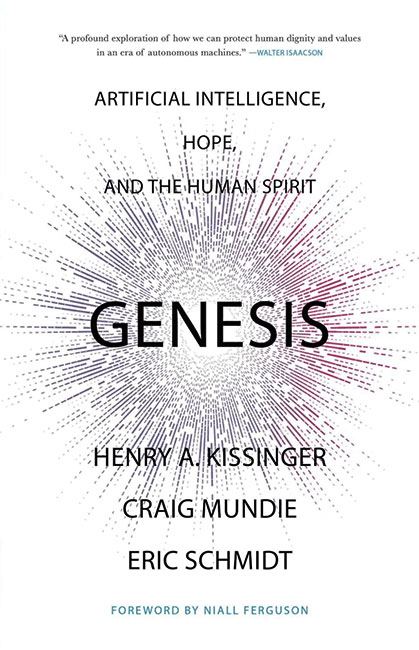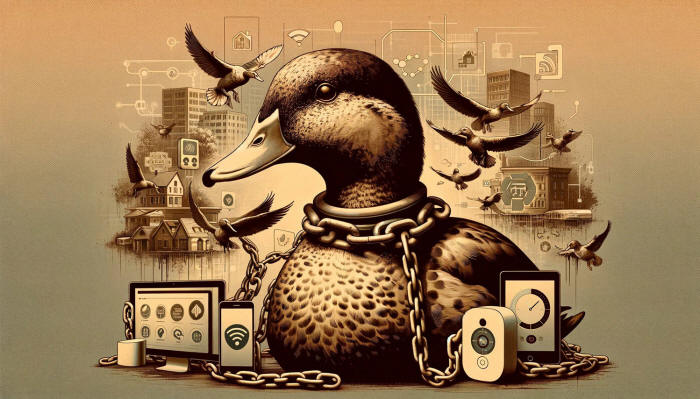
by Patrick Wood
September 10, 2024
from Technocracy Website
| Patrick Wood is a leading and critical expert on Sustainable Development, Green Economy, Agenda 21, 2030 Agenda and historic Technocracy. He is the author of Technocracy Rising – The Trojan Horse of Global Transformation (2015) and co-author of Trilaterals Over Washington, Volumes I and II (1978-1980) with the late Antony C. Sutton. |

Two members of the Trilateral Commission, Henry Kissinger and Eric Schmidt, team up to explain how AI,
is the beginning of a new stage of human evolution.
Amazon’s summary:
“Charting a course between blind faith and unjustified fear, Genesis outlines an effective strategy for navigating
The book will be released on November 19, 2024, after the momentous U.S. election.
Kissinger, of course, is
dead, having passed his mantle and baton to fellowTrilateral CommissionerEric Schmidt.
They argue that,
“in the Age of AI, humanity will change” and that “we will need a fundamentally new form of control.”
In the video below, the authors state,
“I believe we are heading into a new age where our perceptions of reality will have changed. We know that they have a different perception of reality.
They understand it differently.
What we don’t know is, is there a different reality or are they perceiving the current reality differently?”
I have suggested in the past that AI will collapse “reality” for billions of people on the Earth:
Warning – The Total Collapse of Reality Could Be at Hand
As described above, asimulacrumis anti-reality…
This is not a paradigm shift of reality. This is not a “new realty”. This is not reality, period. Unfortunately, billions of people risk being captured by it.
While everyone is looking at shiny newsimulacraforming right before their eyes, reality is escaping out the back door.
We will have to wait to read ‘Genesis’ until November 19th but here are three summaries to give you an idea where it is going.
Axios
The last of 20 books written by the late Henry Kissinger – this one co-authored by former Google CEO Eric Schmidt and former Microsoft exec Craig Mundie – will explore,
“what it means to be human in the age of AI.”
Why it matters:

“
Genesis,” out Nov. 19, wrestles with the massive implications of machines becoming our active collaborators, the publisher notes.
It’s a sequel to Schmidt and Kissinger’s prescient 2021 book, “
They also made an
above animated videowith the help of AI that included a cartoon rendering of Kissinger, who died last year at 100.
What they’re saying:
“We wanted readers to weigh the fact that for all the remarkable technological progress we are witnessing, we still need to make difficult decisions with partial knowledge, in ambiguous situations, and without the comfort of absolute moral certainty,” Schmidt tells
Amazon
As Artificial Intelligence (AI) becomes more dynamic and ubiquitous, it is dramatically empowering people in all walks of life while also giving rise to urgent questions about the future of humanity – a historic challenge whose contours and consequences are revealed by three eminent thinkers in Genesis.
As it absorbs data,
gains agency, and intermediates between humans and reality, AI will help us to address enormous crises, from climate change to geopolitical conflicts to income inequality.
It might well solve some of the greatest mysteries of our universe, revolutionize fields as diverse as medicine and architecture, and elevate the human spirit to unimaginable heights.
But it will also pose challenges on a scale and of an intensity that we have never seen:
usurping our power of independent judgment and action, testing our relationship with the divine, and perhaps even spurring a new phase in human evolution.
Whom will we choose to lead our species through this wilderness?
Or have we, passively and unwittingly, already chosen?
Charting a course between blind faith and unjustified fear, Genesis outlines an effective strategy for navigating the age of AI.
The last book of elder statesman Henry Kissinger, written with technologists Eric Schmidt and Craig Mundie, it prepares the decision-makers of today, that is, all of us,
for the choices of tomorrow, and equips us to seize the opportunities presented by AI without falling prey to the darker forces that this revolution has unleashed.
Paris Libraries
A few short years ago, artificial intelligence (AI) inhabited a small corner of the public debate.
Today, following rapid advances in technology, AI is a front-page topic of global news outlets and an issue on the minds of leaders in science, business, and politics the world over.
New Al and human responses to them could transform,
- the nature of truth
- the human relationship to reality
- the exploration of knowledge
- the physical evolution of humanity
- the conduct of diplomacy and war
- the international system…
These are the crucial issues of the coming decades, and they ought to be the guiding concerns of leaders in every arena.
The new capabilities of AI today, impressive as they are now, will appear weak in hindsight and its powers are increasing at an accelerating rate.
Powers we have not yet imagined are set to infuse our daily lives.
Future Al will facilitate enormous advances in education, medicine, and basic sciences…
Al could discover new medicines to cure pernicious disease and new materials to produce cleaner, more efficient energy.
They could predict the occurrence of earthquakes and design evacuation strategies.
They could revolutionize the availability of education in every language.
These machines’ capabilities come with technical and human risks…
Today’s technologies function in ways that their inventors did not predict, and that pattern is likely to continue.
Al seems to compress human timescales.
Objects in the future are closer than they appear.
The advent of artificial intelligence is a question of human survival.
Al’s future powers, running at inhuman speeds, will render traditional regulation useless.
We will need a fundamentally new form of control…
Once they have coalesced around a consensus, nations and international organizations must develop new political structures for AI monitoring, enforcement, and crisis response.
That will require the resolution of not one but two “alignment problems”:
- the technical alignment of human values and intentions with the actions of Al
- the diplomatic alignment of humans with other humans…
In the Age of AI, humanity will change.
The only question is whether we will choose to continue to assert authority over how that change occurs…

by A Lily Bit
May 21, 2024
from ALilyBit Website
| A Lily Bit Former intelligence operative analyzing the “Great Reset,” the “Fourth Industrial Revolution,” propaganda, totalitarianism, current narratives, psychology, and history. What matters now isn’t storytelling; what matters is telling a true story well. |

In our “modern era,” the pursuit of convenience has become an all-consuming obsession, driving the gears of a consumer economy hell-bent on making life ever more effortless.
This relentless quest for ease has morphed into a self-perpetuating cycle of demand and supply, with each new convenience merely fueling the hunger for more.
In this technological wonderland, the limits of possibility are bounded only by the depths of our credit lines, as we are seduced by instant gratification.
Like a junkie chasing the next high, the modern convenience addict remains blissfully oblivious to the insidious damage wrought by their compulsive need to streamline every aspect of life.
The true cost of this “convenience” is carefully concealed behind a façade of slick marketing and empty promises, as corporations exploit our desire for ease to line their pockets at the expense of our well-being.
Over the past six to seven decades,
we have witnessed a shift in our cultural values, as disposable consumerism has become the new gospel…
The notion that life must be effortless has been sold to us as the ultimate aspiration, with the mundane realities of existence recast as obstacles to be circumvented or outsourced in the pursuit of leisure.
This programming has been so effective that entire generations now place an almost religious value on convenience, while simultaneously developing a pathological aversion to even the slightest hint of inconvenience.
This manufactured intolerance for inconvenience has reached such absurd heights that we now perceive even momentary delays in the delivery of our desired conveniences as unacceptable affronts to our entitled sensibilities.
The irony of this situation is lost on most, as they fail to recognize that their single-minded pursuit of ease is, in fact,
a form of enslavement to the very corporations that profit from their addiction…
The rise of convenience culture has had a corrosive effect on our social fabric, as we increasingly outsource even the most basic human interactions to digital platforms and services.
The result is a society that is more isolated, disconnected, and emotionally stunted than ever before, as we sacrifice genuine human connection on the altar of convenience.
Moreover, by outsourcing our decision-making and personal responsibility to algorithms and automated systems,
we have created a society that is fundamentally incapable of critical thinking, empathy, and genuine human connection.
We are sleepwalking into a future where our every move is monitored, our every choice is predetermined, and our every thought is shaped by the very entities that profit from our complacency.
The very notion of inconvenience has become an anathema, a blight to be eradicated at all costs.
We have become so enamored with the idea of seamless, frictionless living that we have unwittingly shackled ourselves to a lifestyle of ever-increasing complexity and dependence on convenience.
This insidious tyranny of convenience is perhaps the most pervasive and addictive form of oppression in the modern age, and yet we remain largely oblivious to its grip on our lives.
When we think of tyranny,
our minds often conjure images of despotic leaders and oppressive regimes, the likes of Stalin, Mao, and the Berlin Wall…
However, a closer examination of human behavior reveals that our lives are more often dictated by our own habits and preferences than by any external force.
The self-imposed limitations that prevent us from living authentic and empowered lives are just as tyrannical as any dictatorial decree, and in an era of rampant consumerism and instant gratification,
the human race has never been more easily manipulated…
“Those who would trade
freedom for convenience,
deserve neither freedom, nor security,
and will end up with inconvenience.”
Sigmund Freud
It is in the mundane routines of our daily lives, in our inflexible habits and subconscious patterns, that we truly relinquish our freedom.
This is where we are most vulnerable to exploitation, where our true identities are hijacked and replaced with a programming that compels us to pursue the hollow consumerist ideal of convenience above all else.
One cannot help but wonder if we have become mere automatons, mindlessly executing programs designed to keep us complacent and subservient.
Are we nothing more than slaves, conditioned to perform specific tasks in exchange for a carefully calibrated system of rewards and punishments…?
In an age of unprecedented challenges and complex global issues, when the majority of society seems content to hide behind a veil of cognitive dissonance, it is crucial that we break free from the habits and cultural norms that keep us enslaved.
From the
the media we consume, from the way we work to the way we interact with others, the pursuit of convenience has become the driving force behind our choices and behaviors…
We have become so accustomed to the ease and speed of modern living that we have lost sight of the value of effort, struggle, and genuine human connection.
In the name of convenience, we have willingly surrendered our privacy and autonomy, embracing corporate and government surveillance through our smart devices or online browsing habits.
We have become so enamored with the idea of a frictionless existence that we eagerly accept concepts like Central Bank Digital Currencies (CBDCs) and digital IDs, all for the sake of,
avoiding the minor inconvenience of carrying a purse or engaging in basic human interaction when purchasing a bottle of booze to drown our sorrows and numb our aching emptiness within.
We have become so conditioned to “prioritize ease and efficiency” above all else that we fail to recognize the insidious erosion of our fundamental rights and freedoms.
By allowing corporations and governments unfettered access to our personal data and financial transactions, we are effectively handing them the keys to our lives, granting them the power to manipulate, control, and exploit us in ways we cannot even begin to fathom…
The implementation of CBDCs, in particular, represents a dangerous step towards the complete centralization of financial power in the hands of a few unelected bureaucrats and corporate interests.
Under the guise of convenience and security, these digital currencies threaten to eliminate any remaining vestiges of financial privacy and autonomy, subjecting every transaction to the scrutiny and control of the state.
Similarly,
the push for digital IDs is nothing more than a thinly veiled attempt to create a comprehensive surveillance state, where every aspect of our lives is tracked, monitored, and analyzed for the benefit of those in power.
By linking our identities to a centralized database, accessible to both corporations and governments, we are effectively surrendering our right to anonymity and self-determination.
In our desperate bid to avoid the inconvenience of being harassed, detained, interrogated, fined, arrested, tased, or shot by an increasingly authoritarian government, we have willingly surrendered our freedoms and dignity.
Convenience, it seems, has become a far more insidious and effective tool for tyranny than the barrel of a gun…
Our modern banking system stands as a prime example of this subtle form of oppression, its tentacles reaching far and wide, affecting nearly every individual on the planet.
Even a cursory examination of central banking reveals how it preys upon our desire for convenience, ensnaring the world in an inescapable web of debt.
These financial institutions conveniently print as much money as the world demands, and in return, we blindly consent to owing exponentially increasing, mathematically unpayable sums to a private corporation for the rest of eternity.
While it may seem convenient in the short term, the long-term costs are staggering.
What is most alarming is that we do not submit to this tyranny out of fear for our lives, but rather out of a deep-seated desire for convenience and an aversion to inconvenience.
We have been conditioned to ignore our own best interests, to remain complacent in the face of our increasingly complex and oppressive lives.
The truth is that,
the problem lies not in the fact that tyranny is being sold to us, but rather that we have already bought into what they have sold.
We are so deeply addicted to the allure of convenience that we cannot fathom turning back now, even as we see the chains of our own enslavement tightening around us.
This is not a call for Luddism or a rejection of technology itself, but rather,
a plea for a more thoughtful, critical, and human-centered approach to innovation.
We must demand technologies that empower us, rather than exploit us, and systems that serve our interests, rather than those of
We must build a future that values freedom, creativity, and genuine human flourishing over the hollow promises of convenience and “security”…










